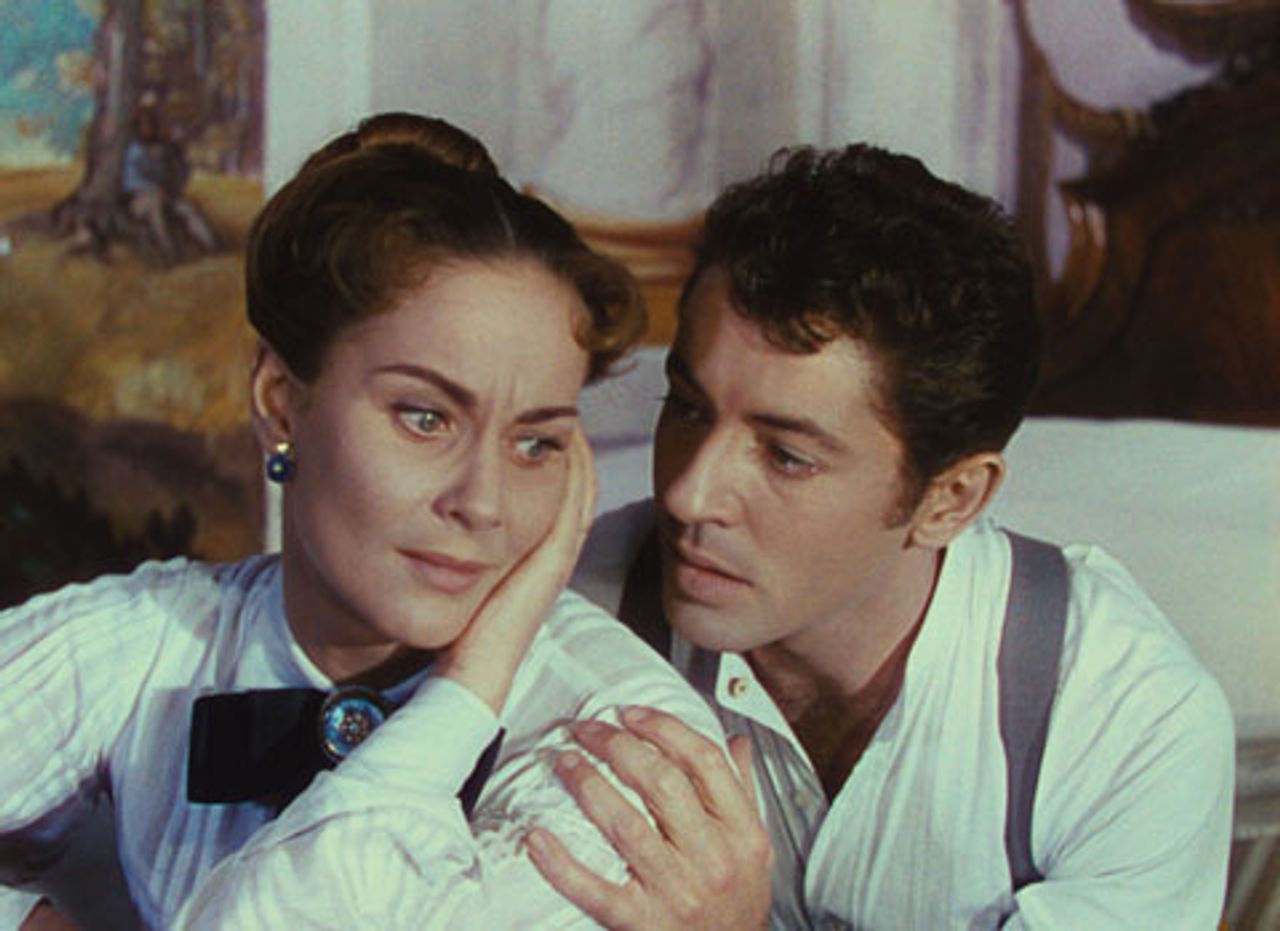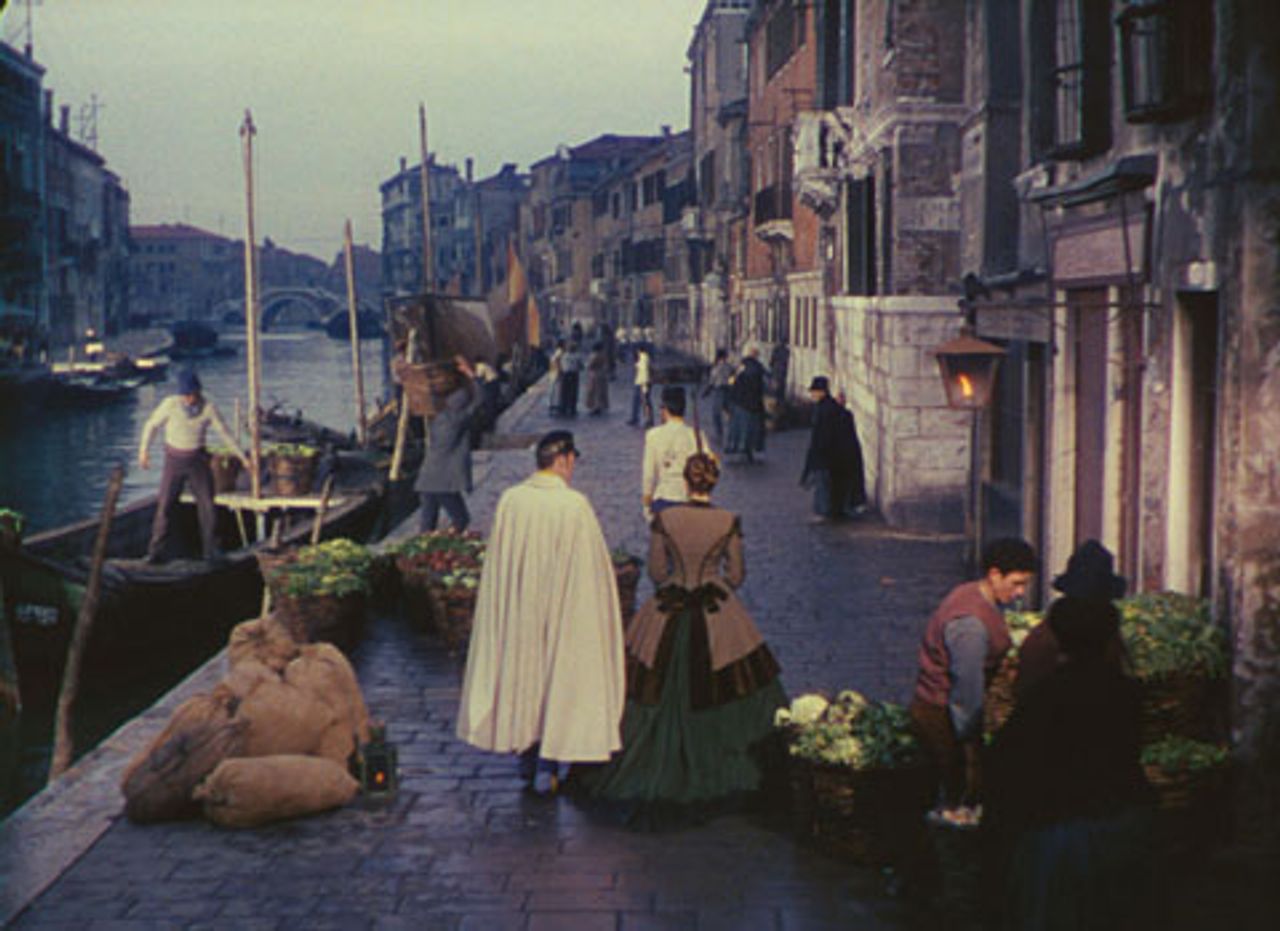This is the sixth and concluding part of a series of articles on the 2010 San Francisco International Film Festival, held April 22-May 6.

Senso, the 1954 film directed by Luchino Visconti about the Italian national unification struggle in the nineteenth century, is a beautiful and important work.
Visconti (1906-1976) was one of Italy’s leading filmmakers in the postwar period. He gravitated from his early neo-realistic work (Ossessione, La Terra Trema) toward more elaborate historical and psychological portrayals in a series of remarkable films: especially Senso, The Leopard (based on the novel by Giuseppe Tomasi di Lampedusa, 1963), Death in Venice (based on the Thomas Mann novella, 1971) and Conversation Piece (1975).
Visconti, descended from Milanese aristocracy on his father’s side and great industrial wealth on his mother’s, turned to the left in the 1930s. He began his film career in France working on Jean Renoir’s A Day in the Country (1937). He also declared himself a Marxist around this time and maintained a long relationship with the Italian Communist Party (in 1944, he was nearly executed by the Fascists for harboring partisans). Visconti never made a secret of his homosexuality.
At the time of its release in the mid-1950s, Senso was criticized by some on the Italian left for its abandonment of the tenets of neorealism, which favored the naturalistic treatment (in black and white) of working class or peasant subjects, often using non-professional performers.
 A scene from Visconti’s Senso
A scene from Visconti’s SensoIn the brilliantly hued and operatic Senso (with a cast of movie actors), an Italian countess, whose cousin is a radical Italian nationalist leader, falls head over heels for a handsome young soldier in the occupying Austrian army in Venice in 1866. She betrays the Italian cause out of love and lust, only to discover that the Austrian has been using her for her wealth and prestige. She takes revenge ….
Like Satyajit Ray’s The Music Room, Senso has been painstakingly restored, under the auspices of The Film Foundation. The organization explains: “Visconti and his cinematographers Aldo Graziati (who tragically died during the shoot) and Robert Krasker fashioned a palette that was both delicate and vivid, rich in its historical associations and its evocations of landscape painting of the period. For that reason alone, Senso has been extremely difficult to restore, and the shrinkage and overall damage to its original three-strip Technicolor camera negatives have only increased the level of difficulty. Now, with the advent of digital techniques the Cineteca di Bologna and L’Immagine Ritrovata have joined forces to restore this magnificent film to its original grandeur.”
The effort has been worthwhile. The color and detail are extraordinary. One does not see scenes and décor like this every day. Although, as French critic André Bazin argued at the time, “Visconti continuously seeks to impose upon this magnificent, beautifully composed, almost picturesque setting the rigor and, most importantly, the unobtrusiveness of a documentary.”
 Director Luchino Visconti
Director Luchino ViscontiFamously, director Visconti persuaded Ingrid Bergman and Marlon Brando to play the leading roles, but the producer preferred Alida Valli and Farley Granger. In fact, both Valli and Granger perform very well. Few films bring out so clearly as this one does the complex relationship between public and private life, between political and personal commitment, as well as various means by which people fool themselves about their lives and desires. It is also an extraordinary historical panorama.
Senso begins, sumptuously, in the opera. The national and social elements are distributed throughout the various levels of the Venetian opera house: the Austrian occupiers in the orchestra seats, the Italian elites in the boxes, the middle classes farther up, and so on. A performance of Verdi’s Il Trovatore (“To arms! To arms!” cries the chorus) inspires the nationalist elements; they shower the Austrians with leaflets demanding their departure and calling for the liberation of Italy.
One of the Austrians in the crowd, Franz Mahler (Granger), casually insults Italian national honor. Marquis Roberto Ussoni (Massimo Girotti), a leader of the Italian volunteer forces, challenges him to a duel. Ussoni’s cousin, the married Countess Livia Serpieri (Valli), arranges an encounter with Mahler and implores him not to proceed with the duel. Ussoni is exiled for a year instead. He hands over a large amount of money to Livia, for use to buy weapons for the volunteer forces.
Livia and Mahler begin an obsessive affair, although, before too long, his ardor seems to cool. Eventually, fighting between the Austrians and Italians breaks out, and Mahler is called away. However, he wants no part of the war. Desperate, he shows up at Livia’s country estate, where she has been sent by her husband to keep her out of harm’s way. Mahler needs money to bribe a doctor so he can obtain a medical discharge. Livia gives him the nationalists’ cash, and he leaves. Ussoni’s forces and the rest of the Italians suffer defeat at the hands of the Austrians, although the latter are clearly losing the struggle and the new Italian bourgeois-aristocratic alliance, including Livia’s husband, is gaining the upper hand.
From Verona, Mahler writes to Livia, explaining how he managed to get out of the army, telling her that he still loves her and insisting that she not visit him. She disobeys and flies immediately to the Austrian, discovering him—drunk and dissolute—in the arms of a prostitute. He insults and abuses her, accuses himself of “cowardice and vice,” and finally kicks her out of the apartment. Livia goes to the Austrian high command with the compromising letter, which proves Mahler is a deserter. Punishment is meted out.
Visconti had many profound concerns when he directed Senso. Basing himself on the work of Antonio Gramsci, among others, on Italian history, the filmmaker means to indict the Italian bourgeoisie for the counter-revolutionary deal it came to with the landed gentry during the Risorgimento and the betrayal of the democratic, egalitarian aspirations of the people. The Italian elite, personified by Serpieri and others, carries out national unification in mortal fear of the “lower classes.”
Ussoni, on the other hand, seems to represent the impotent, demagogic “radical” elements, never short of phrases, but incapable or unwilling to organize the mass of the population. He tells his cousin, “We have no rights now, Livia, only duties. We must forget our own interests,” but the words are hollow. He is useful to those on top of Italian society for his ability to stir up the crowd but dispensed with when his services are no longer necessary.
Italian censorship apparently made Visconti remove a scene in which Ussoni attempts to supplement the Italian (Piedmontese) army of King Victor Emmanuel II with his volunteers, and is told that his units are of little use. Ussoni, according to film historian C. Paul Sellors, “responds in disgust, articulating that the war is little more than a royal land grab.” Another writer on cinema history, Millicent Marcus, argues that this scene’s excision “succeeded in removing the film’s true revolutionary sting.”
Presumably, in Visconti’s conception, in this “failed revolution” of the 1860s the ultimate triumph of fascism under Mussolini finds a foreshadowing. Moreover, by further extension, Visconti intended the work as a condemnation of the newly restored Italian “democratic” government, propped up and financed by American imperialism. Of course, the fact that the party with which he aligned himself, the Communist Party, was principally responsible for the ability of the discredited and despised Italian bourgeoisie to maintain itself in power at the end of World War II, was not something that Visconti proved able to treat.
There is another important side to Senso, which is complicated, and perhaps several viewings of the film are required to satisfy oneself as to Visconti’s own position.
Livia throws herself headlong into the affair with Mahler (named for one of Visconti’s favorite composers, intriguingly enough). As an unhappy wife trapped in a loveless marriage, no longer so young, and involved with a handsome young man, Livia’s conduct is understandable up to a point.
Of course, when she hands Mahler the 3,000 florins and deprives the volunteer forces of arms with which to fight the Austrian enemy, Livia crosses a line. (The scene is unforgettable, as Mahler distractedly mouths, “My love, my love!,” while he concentrates on scooping up the precious gold coins.)
Visconti paints the early stages of the relationship in a manner that underscores Livia’s heedlessness in particular. She says in a voice-over: “Time stood still. Nothing existed but my guilty pleasure at hearing him talk and laugh.” Later, Franz and Livia have this conversation:
Franz: For Countess Serpieri the past doesn’t exist. There’s only now and tomorrow.
Livia: Only now.
Franz: Is there no tomorrow?
Livia: If someone told me “You’ve only today—there’ll be no tomorrow,” I would feel as if a doctor has said “You’re dying. You’ve only a few hours left to live.” And now I know it’s true. There’s only now, Franz. We’ll have no tomorrow.
In my opinion, when Visconti has his character repeat these melodramatic lines, he has not forgotten their context. Livia has been placed by the film in a definite situation: the cousin of a leader of the “national revolution,’ charged with a considerable responsibility herself in an increasingly threatening political-military situation. Individuals don’t merely act in this way or that in the abstract, they choose to do one thing instead of doing another.
Visconti is not moralizing, in my opinion, but arguing and showing that there is a desperate, delusional element to Livia’s conduct (the fact that the “decadent,” cynical Mahler cannot genuinely reciprocate the feelings only emphasizes this). The director has already hinted at Livia’s half-hearted commitment to the cause, her susceptibility to blandishments, her vanity and selfishness. People are not simply “swept away by uncontrollable passion,” the film suggests; there may also be a semi-calculated desire to evade challenging problems and responsibilities by giving oneself up to emotional excess. Extreme “sensuality” here is something of a refuge for a certain type of personality from a difficult social situation, and, at any rate, a dead end. At the conclusion, we assume Livia will return to her unappealing, repressive husband.
Rarely has this problem of “the political and the personal” been addressed so forthrightly, and in the context of enormous events. Visconti is a unique figure, in many ways. Critics from the French “New Wave” (Jean-Luc Godard) and elsewhere complained that Senso suffered from a lack of spontaneity. The film does stagger and stiffen occasionally, one feels, under the weight of its ambitions, and its ideological debt to Gramsci, Georg Lukacs (on the nature of realism) and others. And one should not forget the pressure of the deeply false theories (“socialist realism,” “proletarian culture”) that was still being exerted on artists in and around the Stalinist milieu.
On the whole, Visconti’s determined attempt to make lifelike, dramatically convincing sense of individual human behavior as the expression of historical and social processes is both illuminating and liberating. This is the way toward life, not away from it.
Bazin, a political opponent of Marxism, somewhat grudgingly remarked: “Visconti claims that in Senso he wanted to show the ‘melodrama’ (read: the opera) of life. If this was his intention, his film is a complete success.… Senso has the density and the import of reality.”
Indeed, while watching Senso, one muses: If only contemporary film writers and directors could be compelled to watch Visconti’s work 10, 15 or 20 times.…
Of course, fantasies aside, the process doesn’t work that way. The chief problem with today’s filmmakers is not their lack of knowledge of past filmmaking, although this is a problem, but their lack of important experiences, deep thoughts and feelings, and, consequently, things to say.
Even those “students of cinema history” among contemporary directors, when they attempt to remake an older work, for example, or emulate it in some manner, generally botch the job.
The principal task is not to reshoot a significant film from another period, or even necessarily pay homage to it, but to adopt a similar seriousness toward contemporary life as the “classical” director did toward his or her own time. This is largely missing.
Concluded
